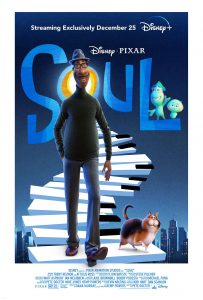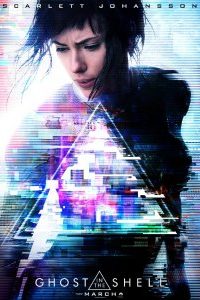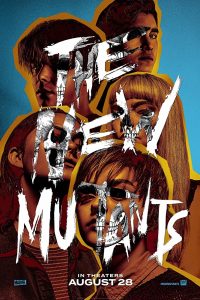My Whole Existence Is Flawed, You Get Me Closer to God: Josh Pearce and Arley Sorg Discuss Soul
 Disney/Pixar returns to the afterlife in Soul, the story of middle school teacher and jazz musician Joe Gardner (voiced by Jaime Foxx) who winds up in a coma after his body and spirit are separated in an accident. While trying to avoid going into the Great Beyond, Spirit-Joe escapes into the Great Before, where newly created souls are prepared for corporeal existence.
Disney/Pixar returns to the afterlife in Soul, the story of middle school teacher and jazz musician Joe Gardner (voiced by Jaime Foxx) who winds up in a coma after his body and spirit are separated in an accident. While trying to avoid going into the Great Beyond, Spirit-Joe escapes into the Great Before, where newly created souls are prepared for corporeal existence.
There he teams up with 22 (Tina Fey), a soul who has no desire to live on Earth, and who promises to give Joe their* pass out of here if he’ll help them find the spark that every soul needs to be complete. The clock is ticking: Joe has until that evening to return to Earth, recover his body, and make it to his first big gig with the famous Dorothea Quartet, which will secure the life he’s always wanted to live.
Arley: During the movie, I pretty much enjoyed it, I was engaged, I was curious. At the end of the movie I was like okay, yeah, I enjoyed it. But then I started thinking about the experience of watching it, and there were a few moments where I was like, “Wait, what the fuck?” And the more I talked about it, I realized it was really problematic. I was like, there’s no way a Black guy wrote this. And I looked it up, and it was two white guys and one Black guy. The white guys were billed first. It’s sad, because Pixar movies, when they hit you, they really hit you; and there aren’t a lot of movies starring Black or POC characters.
Josh: Are you talking about the aspect of a character voiced by a white woman taking over a Black guy’s body?
Arley: Yes. But, well that didn’t bother me as much as specific moments. I was surprised when he ended up in the cat because I expected them both to end up in the body and fight for control. What bothered me was when they go into the barbershop. Like Wonder Woman 1984, there’s this fish out of water thing, but in this one, five minutes into the fish out of water scene, the white woman-coded character goes in to a Black barbershop and immediately schools all these Black guys, who end up hanging on her every word, just learning all about everything from her. I was like, don’t do that. Don’t. Do. That. Barbershops are centers of community, often places of wisdom. Don’t have a white woman go in and “teach” an entire community of Black folks all about life, as if they have no lived experiences and wisdom. It would have been more “fish out of water” if she had gone in there and learned from this community. There were a lot of things along those lines, with race, with gender: Dorothea (Angela Bassett) is supposedly a strong personality, but what happens is Joe goes in and immediately takes over the show, and she immediately acquiesces. That’s not how jazz works, and that’s not how you respect a strong personality in story. In reality, if Joe had just gone off tooling on his own like that, he wouldn’t get the gig. She’d be like, “You’re a good musician, but you don’t know how to play with other people.”
Unlike Coco, Soul‘s vision of the afterlife doesn’t draw from any recognizable pre-existing religious cosmology. Its metaphysical system might feel similar to Pete Docter’s previous directorial credit, Inside Out, which was also Pixar’s only other attempt at anthropomorphizing abstract concepts and a departure from elements — such as toys, cars, monsters in the closet, and bugs — probably more familiar to an audience of children.
Behind the bright, colorful lights and glowing, bubbly characters there are complex ideas and a free-ranging plot that mostly revolves around a middle-aged man. There are almost no child characters with speaking roles (unless you count pre-embodied eternal souls) nor any cute and cuddly characters that can be merchandised into plush toys (again, unless you count pre-embodied eternal souls). As such, there is very little to hold the attention of Pixar’s usual target audience.
Josh: This is not a kids’ movie. Kids would be bored. Not even teens would be very interested in it, I think.
Arley: Early 20s and up. And oddball teens. Teens like me — I was an oddball teen. What did you think about the lines where they were explaining all the quantum stuff?
Josh: I liked it. It didn’t feel like they were using quantum for quantum’s sake, and it sounded like they were pulling in an actual example of quantum consciousness, which is a thing?
Arley: It made it areligious.
Josh: Interesting that they sidestepped the question of heaven or hell, or any kind of moral judgment after death. That, combined with the line-drawing creatures and the Tron-looking afterlife made me think, “This is actually a science fiction movie.”
The obvious standout of the film is its soundtrack, from Jon Batiste’s jazz over the streets of New York to the Trent Reznor/Atticus Ross score underlining the underworld. The contrast between the two settings is striking: the sedate pace of the camera, moving through the server-farm-looking afterlife to the bleeps and blips of Reznor and Ross’s synthesized electronica, signals that we are in a place that is, well, soulless. Add to that the abstract-art counselor Jerry (voiced by multiple) and accountant Terry (Rachel House) who look at home in EKG monitors and crosswalk signals; the afterlife’s miles of files where a record of every human birth, death, and action is tallied; and the indication that, despite their underlying quantum nature, these souls are bound to a deterministic path — you end up with a big picture of a universe fairly grim and mechanistic.
By comparison, Soul‘s depiction of NYC is loud and vibrant with all the chaos of traffic complicated by navigating a meatbag through sensory overload. There are buskers, construction noise, a Babel of languages, there is jazz, and an uncountable, incalculable number of human interactions. This is the central message to Soul, that it is within these tiny details where life finds its purpose. Maximal sensory input makes life worth living. It is a paean to hedonism directly opposite the stoic asceticism found among the inhabitants of the Great Beyond (who don’t care that they’re dead) and Great Before (who find even the desire to receive recognition for a job done correctly overdoing things just a bit).
Arley: I appreciate that even though it was (mainly) written by two white guys, there was a lot of diversity in it. The scene where they were crossing the street, I was like, “I don’t think there’s a single white person in this shot.” There was something in Soul that reminded me of The Matrix Reloaded, where Neo meets the Architect and they have a half-hour long philosophical conversation. In this, Joe meets Jerry and they have the same conversation, but efficiently boiled down to two minutes. Thematically, it’s similar to It’s a Wonderful Life, messaging that life is worth living for the small things.
Josh: It had a “deep” message that wasn’t very deep. And I’m not a foodie, so any time someone tries to tempt an alien or supernatural creature with food feel, I don’t buy into it. How are you going to tempt an eternal supernatural cynical being with a piece of pizza? That’s saying a lot about pizza.
Arley: I liked how they portrayed the reaction to that scene though, the internalized aspect rendered as visuals, and then how she was trying to play it cool. Pixar has been doing a good job lately of painting reactions that are hard to show, here visualizing taste through pops of color.
Josh: Yeah all the visuals were cool. That was probably my favorite part of the movie, all the afterlife stuff with the hypnotic music.
Arley: There were a lot of understated, really well done visuals that don’t hit you over the head. I liked the simple line creatures and how they utilized them throughout, and quiet moments, deliberately without dialogue — not quite silent because there’s still ambient music, but I thought it was really effective.
The difference in settings combined with the free-form nature of the plot structure gives the feeling of watching two or three different movies: there’s the down-to-Earth stuff with Joe trying to realize his dream; the afterlife stuff where 22 tries to gain their spark; and then an entirely different tonal shift involving a cat. A further subplot involving mystics and creative types entering “the zone” thrusts viewers into a dreamlike (or nightmarish) section of the film, and that messes with one’s sense of time even more. How much time has passed since Joe fell into a coma? The urgency of the main plot line is deflated by the effort of keeping track of all the pieces.
Arley: The experience of watching Soul felt easygoing.
Josh: There’s a ticking clock, but I didn’t feel the normal anxiety I would. Stories with financial complications drive me nuts, especially if a character needs to like pay their rent by a certain time. Every episode of Cowboy Bebop was like that — I’d be cheering for them to get the bounty and then, invariably, they’d fail to cash in for some reason. Uncut Gems, man, that was the worst. Even Harley Quinn trying to get her breakfast sandwich in Birds of Prey was more compelling to me than Joe’s struggle to get to the club in time for the gig. So I can get caught up in a ticking clock story, for sure, but I didn’t feel it at all in Soul.
Arley: They set up the stakes, but I didn’t care about his character, so I didn’t care if he made it or not. The more you watch him the more you realize he’s super-self-absorbed. They didn’t have to push it to that degree in order to sell their message of “live more in the moment.” He’s a teacher, and when a student comes around to his house for advice, he just blows her off. And then of course 22 AKA white woman fixes the problem he neglected.
Josh: He didn’t seem to be a very good teacher, which I thought would’ve been useful in trying to teach 22 about things. And we both wanted him to die in the end. I thought it was a cop-out ending.
Arley: He seems like a typical toxic guy. Think about the mom. The mom has given up everything to take care of him because his dad died, and in the flashback later in the flick, what you see is him in service to his dad, and his mom in service to him. You never see the guys in service to her. And at the end, she’s watching him play, but he’s playing for his absent dad. So he’s basically trampled all over her life, doesn’t even say thank you, for like, literally making all this possible. The mom has to learn to understand him but he doesn’t have to learn to understand her. Frustrating. You know, I feel like the movie is, in a lot of ways, a series of random events.
Josh: I was thinking about that too, how it seems like two different movies mashed together, which I guess in some sense is just a reflection of the Platonic mind-body dualism the filmmakers whole-heartedly embraced.
Arley: I liked the dark place where all the lost souls were wrapped up in their anxieties. That could’ve been a whole movie by itself right there.
Josh: That was cool! They had a pirate ship, it was super dark, like a Terry Gilliam movie.
Arley: And the dude actually looked like Baron von Munchausen, from Gilliam’s movie. If you caught that, too, it must have been deliberate. Would you recommend this one?
Josh: It’s worth watching, as in it’s pleasing to the eye. You?
Arley: I would, with asterisks, especially, I think, you know, white people are not going to realize certain things about this movie, whereas I think Black people, as soon as they see that barbershop scene, they’re gonna be triggered, period. Maybe even before then. Even the choice to have her control his body is problematic. The concept of white people controlling Black people is something that non-Black writers should not write lightly. They need to research, ask questions, and understand that there is a historical context with which Black people experience these narratives and ideas. It’s potentially harmful. It didn’t bother me, but that doesn’t mean it won’t bother others, and it doesn’t make it right. And even as I mostly enjoyed it, I just had a lot of little moments of discomfort, offset by really wanting to enjoy what is supposedly a Black centered film — one where a white woman corrects a lot of Black people and takes up a lot of the spotlight. Should people watch this or Onward?
Josh: Onward was better. Or it’s at least plot-driven, there’s a deeper emotional pull to it, it plays with tropes, and there’s humor. I didn’t feel like I got anything out of Soul, other than an hour and a half of bright lights and some good music. Like it was all that for a single self help line? Doesn’t seem worth it.
Arley: There are some cool things about it, though. There were funny moments with the cat and the rat and the pizza, and when the cat was trying to talk to humans. It had pops of humor. In a way, it’s the first movie of its kind, and I just hope there are more that are a lot better, more thoughtful, and with that usual emotional power we often get from Disney/Pixar movies.
You can’t really fault a movie for having a “stop and smell the roses” message, but that sentiment arose from Docter’s question (after winning his second Academy Award), “What am I supposed to be doing with my life?” and reinforced by Fey’s assertion that Soul is a “helpful reminder that [life] isn’t defined by achievement or attainment.” [Both from this interview.] Easy for two successful middle-aged rich people to say, maybe not so much for a young person with ambition to pursue mastery over their craft.
That’s okay, though, it’s not really a kids’ movie anyway.
*For the purposes of this review, we’ll be referring to 22 in non-binary terms, since they are an ungendered soul taking on the voice of a middle-age white lady mainly because it annoys other people. (22 demonstrates the ability to use other voices.)
Directed by: Pete Docter & Kemp Powers
Written by: Pete Docter, Mike Jones & Kemp Powers
Starring: Jamie Foxx, Tina Fey, Graham Norton, Rachel House, Alice Braga, Richard Ayoade, Phylicia Rashad, Donnell Rawlings, Ahmir-Khalib Thompson AKA Questlove, Angela Bassett, Cora Champommier, Margo Hall & Daveed Diggs

ARLEY SORG, Senior Editor, grew up in England, Hawaii, and Colorado. He lives in Oakland, CA. A 2014 Odyssey Writing Workshop graduate, Arley is co-Editor-in-Chief at Fantasy Magazine, Associate Editor and reviewer at Lightspeed & Nightmare magazines, interviewer at Clarkesworld Magazine, and reviewer for Cascadia Subduction Zone Magazine. He can be found at arleysorg.com – where he has started his own “casual interview” series with authors and editors – and on Twitter (@arleysorg).
JOSH PEARCE, Associate Editor, started working at Locus in 2016. He studied creative writing at SFSU and has sold short stories and poems to a variety of speculative fiction magazines. Born and raised in the Bay Area, he currently lives in the East Bay with his wife and sons and spends way too much time on Twitter: @fictionaljosh. One time, Ken Jennings signed his chest.
 While you are here, please take a moment to support Locus with a one-time or recurring donation. We rely on reader donations to keep the magazine and site going, and would like to keep the site paywall free, but WE NEED YOUR FINANCIAL SUPPORT to continue quality coverage of the science fiction and fantasy field.
While you are here, please take a moment to support Locus with a one-time or recurring donation. We rely on reader donations to keep the magazine and site going, and would like to keep the site paywall free, but WE NEED YOUR FINANCIAL SUPPORT to continue quality coverage of the science fiction and fantasy field.
©Locus Magazine. Copyrighted material may not be republished without permission of LSFF.








So, you call 22 in non-binary terms, since they haven’t got a gender, which actually make sense. It’s a soul, doesn’t have a body, we don’t know if 22 might be born male or female, or even intersexual. BUT, you see this characer as white (hence the horror with the barbershop scene) just because a white person dubs them? Like, really? A white person we can’t see and can’t even know she’s white just from watching the movie? A real-life woman is something different than a fictional character, for f sake. So if we’ve got a movie where an actress plays a man, don’t we interpret this story as a male-centered story? And this whole “so happy, no white characters in a scene! Yaaay!” Again, really? Is this supposed to be a parody of SJW criticism? Because it sure looks like that.